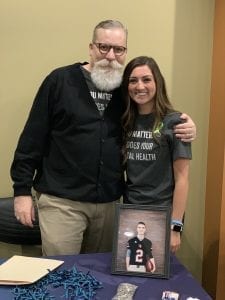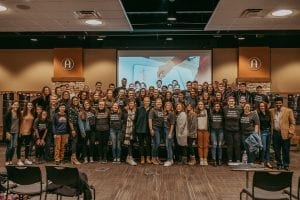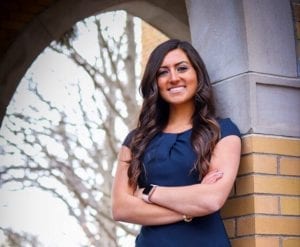2020 Augustana Alumna Works to Make a Difference
Haley DeGreve knows what matters in life. The passionate, driven Moline native – who graduates from Augustana College on Saturday (virtually) – will succeed not only by making a living, but more importantly, by making a difference.

Haley DeGreve
An Alleman High School grad, DeGreve majored in communication studies and business administration marketing. She’s already made her mark as founder of the 16-month-old Gray Matters Collective, a student mental-health group that led her this year to being chosen a winner of the George Orley Student Mental Health Advocate Award from the University of Michigan Depression Center.
The $1,000 award – given to one Michigan student and another college student nationwide – was established by the Orley family after their son George (a Michigan student) lost his battle with depression in 2013, dying by suicide at age 20.
He had lived with depression for 18 months and was diagnosed with bipolar disorder shortly before he died, according to a 2018 story at deseret.com. Plus, he had diabetes and was recuperating from hip surgery that set him back a semester.
DeGreve didn’t know she was even nominated by Augustana, and found out she won in January.
“It was really ironic because I was having a really bad day, and it was one of those days I felt, ‘Am I really making a difference in all that I’m doing?,’ because I think sometimes in this work, it’s very easy to think that,” she said recently.
“For me, I just broke down, and felt really special that Augie did that for me, and also felt some validation that the work I’m doing is important.”

Gray Matters poster campaign
The Gray Matters program started in January 2019, as a stark black-and-white poster campaign to highlight the stigma around mental health and encourage mental health awareness. The posters are displayed across campus featuring current students and their perspectives, and the group (which now has 150 active representatives) has held regular meetings with guest speakers.
DeGreve came up with the idea after being involved in student government, and heard mental health was not being talked about enough with students and faculty. Her goal at first was to put up powerful posters around campus, without explanation. She had people post on social media, to “get people start thinking about it, maybe could give some hope to people who were experiencing these things,” DeGreve said.
“At the time, I was really struggling myself, and I felt like, walking on campus, I would have loved to have seen a positive poster, or something that made me feel I wasn’t alone in what I was experiencing,” she said.
“The whole mentality of The Gray Matters, if you can just make a difference to one person, you’re helping to change that person’s world,” DeGreve said, “and they can continue to change other people’s worlds.”
“We want to inspire each person to bring that knowledge and compassion and awareness to other people they interact with.”
“Haley is a fierce advocate and leader on campus,” said Farrah Roberts, the first director of student well-being and resiliency at Augustana. “She has not only created a movement to empower her peers to share their voices and stories, but provided a safe place for them as well.”
Kevin Atwood, founder of Foster’s Voice — Suicide Awareness, was the guest speaker of the first Gray Matters meeting in February 2019, where 200 people braved an ice storm to attend.

Haley DeGreve with Kevin Atwood
“I didn’t know what it was and Foster’s Voice was just starting to really reach the community,” he said recently. “I had a brief conversation with this beautiful, intelligent, compassionate young lady about mental health and I knew I wanted to help her any way I could. I believe that we must reach our youth to make an impact and the type of change that is needed in our country surrounding mental health and suicide because they are the future.
“Let’s be honest, they have the opportunity now to make the difference or to continue on the path of rising suicide rates and mental illnesses closeted because of the stigma surrounding it,” Atwood said. “Foster’s Voice has been a part of every Gray Matters event and is a huge supporter of what Haley has done on campus.
“Haley is an incredible and very unique person,” he added. “She is so very compassionate, loving and dedicated to making a difference in mental health. So much so that we were honored to add her to the team at Foster’s Voice to help my Foster reach more people and continue to grow in his mission. She works every day to make the world a better place for those who struggle. I believe in her, I believe in her abilities and I believe she will be a leading advocate for mental health in our country.”
Foster’s Voice was founded to honor his son Foster, a 2016 United Township High graduate who planned to be a police officer, and took his own life at 19, in July 2017.
“We’re here to help other people, so other people don’t make the same tragic mistake,” Atwood (who has three other kids with his wife Jaime) has said.
“It’s stealing our youth,” he said of suicide. “Think about the future my son could have held. It affects our communities it affects the world. That’s why we’re here to change it.”
At the February 2019 meeting, Atwood told students: “You are the ones who are going to make a difference. I believe in you to be that change. The ‘gray’ matters. But most importantly, you matter.”
Senior Ethan Conley-Keck was one of the many faces that represented The Gray Matters as he talked about the importance of mental health. “It’s nice to see that these resources are available on campus,” according to an article at augustanaobserver.com. “A lot of people care and I’m glad Augustana is doing more to accommodate stress that comes with college.”
“A lot of people in my life have been affected by mental illness,” sophomore Sage Sanders said then. “I get anxiety easily and having this on campus really helps. The fact that so many people came was heartwarming for myself. I’m not the only person who wants to make a difference.”
An epidemic and desire to serve
In 2018, there were 48,344 suicides in the U.S. (and 1.4 million suicide attempts), compared to 16,214 homicides, according to the FBI and American Foundation for Suicide Prevention (AFSP). Suicide is the second-leading cause of death among Americans age 10-34.
In less than two decades, 1999 to 2017, the U.S. suicide rate rose about 33%, according to a report by the Centers for Disease Control and Prevention earlier this year. Suicides among people 10 to 24 saw a steep 56% rise from 2007 to 2017.
From 2011 to mid-2018, there were 388 suicides in Rock Island, Scott and Henry counties.
The Federal Communications Commission said that last year alone, counselors at 163 crisis centers around the country answered more than 2.2 million calls and more than 100,000 online chats.
Last December, the FCC unanimously voted to proceed with a proposal to set up a new hotline similar to 911 — only, instead of dialing the police, the number would connect callers to experts in suicide prevention and mental health. The number (988) would link callers to an already existing network of crisis centers around the country set up by the Department of Health and Human Services.

Gray Matters
It likely would be available starting in mid-2021. Earlier this month, the Senate on passed a bipartisan bill that seeks to make the national suicide prevention hotline a three-digit number. The act was unanimously passed by a voice vote in the Senate and now heads to the House. Currently, the hotline number is 1-800-273-8255 (TALK).
DeGreve’s grandfather and uncle are retired Illinois state senators — Denny Jacobs and Mike Jacobs (her mom is Mike’s sister). Their background influenced her decision to work in public service, for the good of the community, she said.
“I remember going to the State Capitol to hear my grandpa and uncle speak, and just being inspired, by using your voice and what that can do,” DeGreve said. “I could make an impact with just my voice, what I’m passionate about.”
Denny Jacobs was also an Augie alum, and she wanted to be involved in college and make change. “That’s what he taught us – use your voice for good,” she said. “That’s always what I’ve tried to do.”
She also was deeply influenced by her high school (the Catholic, private Alleman, Rock Island), in its emphasis on faith and selfless service. DeGreve was active with the Northwest Teens Encounter Christ (TEC) program there.
“The people I met there have been such selfless, servant leaders and they taught me about what that means. What it means to do great things.”
“I felt that experience with the TEC program taught me about compassion and hope and joy, what it means to suffer with other people,” she said. “Through that I learned a lot about my own suffering, and how other people helped me. That inspired me to bring that love to other people.”
“I’ve always been extremely passionate about mental health because I’ve seen myself and a lot of my close friends struggle,” said DeGreve.
She’s fought with depression and anxiety since middle school, after being bullied a lot. in middle school. “I was definitely struggling, but I just didn’t know how to talk about it at the time,” DeGreve said. “Even in high school, I never really had the courage to speak up. There is this stigma with mental health that, if you’re suffering with an invisible illness, you could be making it up.
“People won’t believe you, or think that you’re crazy,” she said. “I just never had the courage to do it until I came to Augie. It was really inspiring to see the number of people who stood with me, and said, ‘Enough is enough. We need to talk about this openly and not be afraid.”
“When you struggle with any kind of mental health problem, I think you always question your value and is there something really wrong with me?”
One friend said the thoughts in her head are like her roommates. “You need to get along with your roommates,” DeGreve said. She recalled one of her childhood best friends attempted suicide twice, first in middle school. Cyberbullying continues to be a huge issue, DeGreve said. “Nowadays, with social media, we’re seeing more of that.”
“A lot of research is still being done on what all this technology is doing to our brains,” she said. “The more young kids are getting on social media and they’re seeing each other’s highlight reels, essentially. They’re not ever seeing the bad things happening in someone’s life, struggling with a mental health problem. You’re very depressed and you don’t want to live anymore and you’re on social media, only looking at people’s glamorous lives – on vacation, did this. This person is beautiful and you’re not.”
“It makes you feel even more alone and isolated; that’s your only option, which it’s not,” DeGreve said. “That’s what we try to do with any suicide prevention movement, is to show people that a) you’re not alone, and b) there are options. Healing is possible and attainable. We just have to get you connected.”
At Augie, Amy Nicholson (Class of ’22) said: “I do think mental health is incredibly important and that her raising awareness is wonderful. Especially in college, it can be difficult to keep mental health at the forefront, especially when you’re busy with a million other things, but her campaign reminds a lot of students that it’s still important.”
The importance of de-stigmatizing mental-health talk
The Gray Matters – like so many organizations nationwide – has to overcome the obstacle of a continuing social stigma towards seeking mental-health treatment.
“A lot of it has to do with vulnerability,” DeGreve said. “In our society, it’s often frowned upon to be vulnerable.”

Haley DeGreve
Much of it has to do with the concept of “toxic masculinity,” the tradition of men to handle problems themselves and not display any outward signs of weakness or pain. “You’re taught to be tough, strong and never show any emotion,” she said.
“It completely makes you feel like you’re more alone, and you’re more vulnerable,” she said. “Women obviously have the same struggles too, and they’re seen as overly emotional if they share these vulnerable sides to them. There’s kind of this double-edged sword with mental health. It’s also an LGBTQ+ area as well, and people who come from communities of color.”
Even with the perceived stigma, nearly 13 percent of the U.S. population (over age 12) took antidepressant medication in the past month, according to a 2017 analysis from the National Center for Health Statistics. Most antidepressants are used to treat depression, while some are prescribed for other conditions.
That number jumped 64% between 1999 and 2014; however, twice as many women as men take antidepressants.
“There are so many different facets to this problem, and everybody has a different experience with it,” DeGreve said. “The problem is, there is no one-size-fits-all for mental illness.”
“It’s hard to know how to help everyone, because everyone is different,” she said, noting depression might not look the same from one person to another.
Yet, because anxiety, grief, depression and suicidal thoughts have become so common, it’s critical everyone knows they are not alone, DeGreve said. No one suffers alone and no one should feel they need to handle their problem alone.
“There’s so much work to be done, not just in the nation, but the world,” she said.
A lot of schools are hesitant to support groups like Gray Matters, get pushback because of the perception there’s a mental health problem on campus, and the misconception that the more you talk about suicide, the more kids will consider attempting it, DeGreve said.
“I was lucky that Augie didn’t even think of that and said, if this is gonna help students, we need to support this,” she said.
“The more you talk about it, the more it’s gonna inspire other people to talk about it,” DeGreve said. “There’s a lot of awareness that needs to be put out there. I think the more we talk about it, the more we get people to understand.”
“Gray Matters does work well because we all come together over the plain fact that we matter. Your life does matter and has value,” she said. She helped with last fall’s AFSP suicide prevention walk in Bettendorf (headed by Kevin Atwood’s wife Jaime), which drew about 500 people.
Covid complicates the conundrum
The rise in attempted or completed suicides may be magnified because of coronavirus, which requires much of the nation to quarantine at home. In late March, President Donald Trump predicted “tremendous death” and “suicide by the thousands” if the country isn’t “opened for business” in a matter of weeks.
He’s claimed several times that the number of suicides specifically would “definitely” be greater than the death toll from the virus itself as he pointed to people returning to work as a remedy. As of May 19, the U.S. reported 91,906 deaths due to Covid-19 just in the past three months.
“There are people who struggle with mental health problems who can’t really be alone right now,” DeGreve said. “It’s hard for people to be alone, when you’ve already felt alone.”
“We all have a set resiliency within us, and resiliency is a muscle you can build on, but some people have a hard time doing that on their own, and they need extra help.”

Gray Matters poster campaign
In past disasters, suicide rates have sometimes dropped as people come together. A new report released last month in the Journal of the American Medical Association (JAMA) expresses concern about the potential for increased suicide rates due to economic stress, social isolation, medical problems and other factors related to the pandemic.
“Concerning disease models have led to historic and unprecedented public health actions to curb the spread of the virus,” the report said. “Remarkable social distancing interventions have been implemented to fundamentally reduce human contact. While these steps are expected to reduce the rate of new infections, the potential for adverse outcomes on suicide risk is high.”
The JAMA study also stresses the emphasized need for enhanced suicide prevention efforts.
“We’re seeing it a lot more in my age group,” DeGreve said, noting she wrote her capstone project on suicide prevention this year. “The numbers are increasing. Some of that is connected to technology and feelings of loneliness. Just because we’re more connected doesn’t mean we truly are more connected. I think coronavirus has shown the world that we need community, we need each other more than ever.”
In 2008, adolescents and young adults aged 15 to 24 had a suicide rate of 14.45 per 100,000, compared to 10.2 in 2009, according to AFSP.
Due to Covid-19 travel restrictions, DeGreve was unable to accept the University of Michigan honor in person at an event scheduled for March in Ann Arbor. She’s been invited to the 2021 Depression on College Campuses Conference to receive it.
Covid also postponed the TEDxYouth program in which she was due to speak this month at Davenport’s Putnam Museum. DeGreve will discuss suicide prevention at the rescheduled event March 28, 2021.
Closing out a busy college career
In addition to completing her class work, DeGreve has spent about two years of her time at Augie as a communications student intern at John Deere Worldwide Parts, at its Parts Distribution Center in Milan; volunteered as a sexual health and violence prevention peer educator at Augie, and has been social media manager for Foster’s Voice.
“It’s just been an awesome experience,” she said of working with Deere (about 20 hours a week during the school year. “The people are amazing. I have the most incredible manager. I’ve learned so much; I’ve grown so much.”

Haley DeGreve
DeGreve will work full-time for Deere this summer and hopes to get a permanent job there following that.
Being a peer educator on campus has a healing process very similar to dealing with mental health problems, “or you could have mental-health issues from those traumatic experiences,” she said of preventing violence and sexual assault.
She’s spoken to hundreds of students about bystander intervention (to stop or notify others about incidents of violence). “A lot of times, students want to be listened to by someone who is like them – a student,” DeGreve said.
Peer education extends to The Gray Matters, as she’s helped train the reps on what to say to people who come to you and are struggling, and be that liaison between those who are hurting and those who provide professional help.
Augustana stopped in-person classes the third week of March and she’s worked remotely since then. “I think it’s been a beautiful thing as well, for people to learn to slow down a little bit,” DeGreve said.
She’s due to graduate with the Class of 2020 this Saturday (with a ceremony that students can see on the college’s YouTube channel), with an in-person commencement planned in October at the TaxSlayer Center, Moline.
It’s also hard for new college grads who must face a devastated economy, in which 36 million people sought unemployment benefits since March.
“It’s really scary and it’s something that is adding those extra stressors on that shouldn’t be there,” DeGreve said. “You struggle even more, and it creates extra anxiety. You feel more alone.”
In the past four years, there have been attempted suicides on campus, she noted. “It was very quiet,” she said. “Should there be better communication about the suicide hotline number? Even resources on campus that students can use to access counseling quicker.”
“My experience with The Gray Matters led me to meet so many amazing people and work with some wonderful administrators,” DeGreve said, adding three incoming seniors will lead it next school year. “This collective taught me so much about mental health, suicide prevention and myself.”
One of her profs agrees that she’s got a bright future.
“Haley is exceptionally passionate about social issues,” said Hyeong-Gyu Choi, assistant professor, business administration and marketing, “thriving in her career, and becoming a future public figure who will inspire many young future leaders, with her brilliance and academic achievements under her belt.”











